
From 63 to 34 provincial administrative units, Vietnam has proactively formed large enough growth poles, promoting inter-regional complementary advantages. Merger pairs such as Ho Chi Minh City - Binh Duong - Ba Ria - Vung Tau, Bac Ninh - Bac Giang, Thai Binh - Hung Yen, Hai Phong - Hai Duong... have removed administrative barriers, creating strong economic linkage regions.
General Secretary To Lam speaks at the announcement ceremony of the National Assembly 's Resolution on merging provinces and cities, along with the Party Central Committee's decisions on establishing provincial Party committees and local leadership personnel.
Ho Chi Minh City (expanded) is estimated to reach an economic scale of 123 billion USD, a population of nearly 14 million people, becoming the most influential megacity in Southeast Asia. Secretary of the Ho Chi Minh City Party Committee Tran Luu Quang said: Ho Chi Minh City strives to become a global megacity, capable of connecting directly with Singapore, Seoul, Tokyo, Dubai or Shanghai; a junction in the world urban network, a convergence of capital, technology, knowledge and culture. With a contribution ratio of nearly 25% of GDP and more than 30% of the national budget.
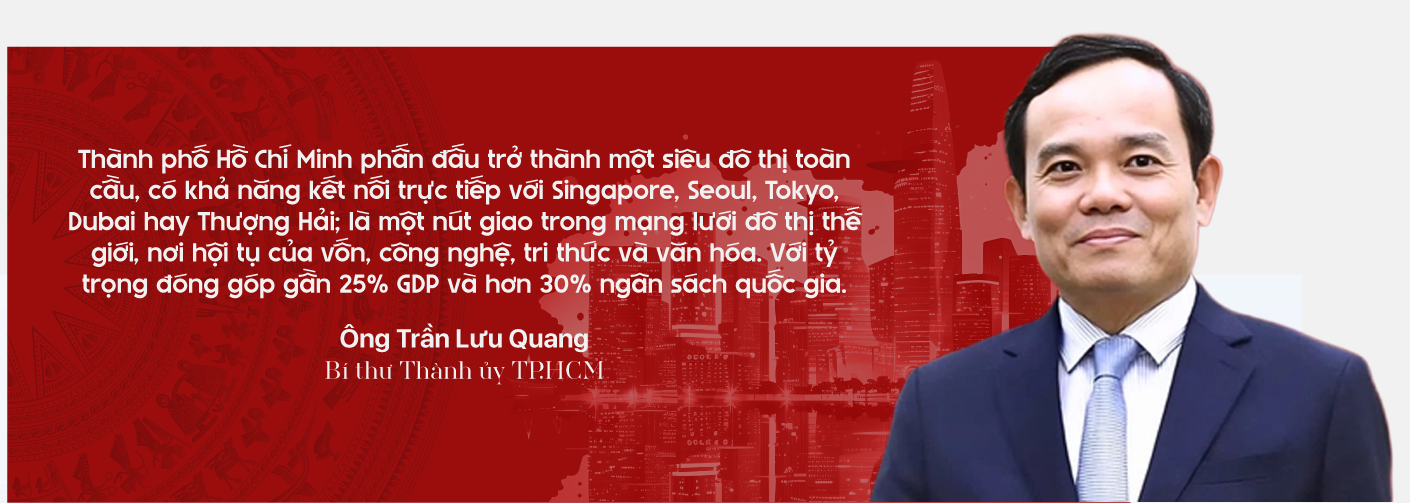
Ho Chi Minh City has more than 350,000 enterprises (nearly 1/3 of the country), the private sector employs more than 80% of the workforce, contributing greatly to GRDP. Mr. Nguyen Ngoc Hoa, Chairman of the Ho Chi Minh City Business Association, believes that: Merger opens up a large economic space, helping businesses connect production, open value chains, develop exports and promote financial services .
In the North, Hai Phong - Hai Duong emerged as a megacity with over 4.6 million people. Hai Phong is the only locality with 10 consecutive years of double-digit GRDP growth; after the merger, its economic scale ranked third in the country. Prime Minister Pham Minh Chinh assessed: The combination of a vibrant Hai Phong, leading in industry and a Hai Duong rich in cultural traditions and high-tech agriculture will help 1 + 1 > 2, creating a resonant strength to lead the development of the whole region . The Prime Minister applauded Hai Phong for promptly and actively implementing the Party's policies and guidelines, calling for investment, mobilizing resources in key areas. The Prime Minister asked ministries and branches to continue to support, Hai Phong to continue to promote the spirit of "saying is doing", "not saying no, not saying difficult, not saying yes but not doing", especially in site clearance, implementing procedures, creating favorable conditions for businesses with the spirit of all for the common good, not allowing corruption, negativity, waste.
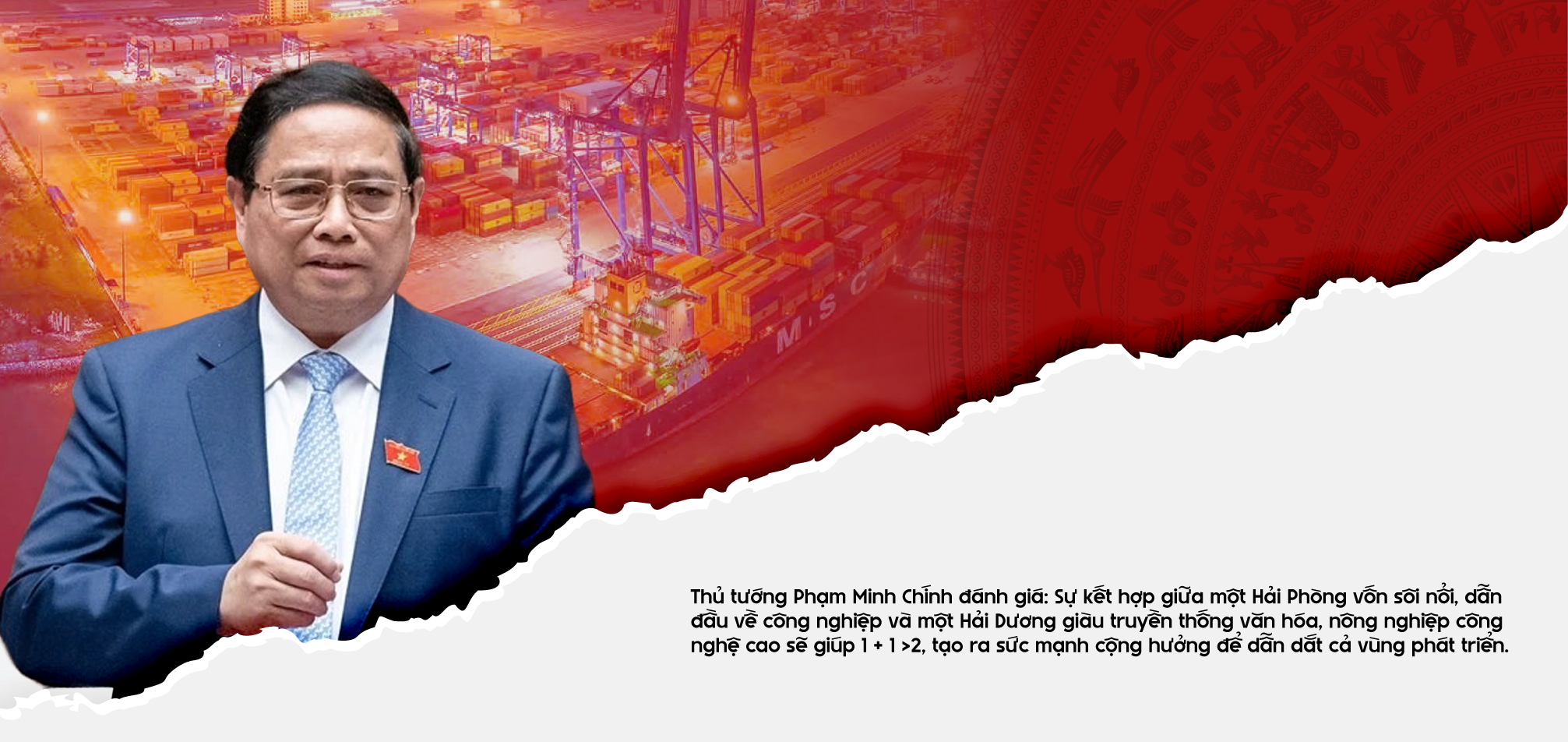
Hai Phong made a strong impression when the budget revenue grew for 4 consecutive years, exceeding the 100,000 billion VND mark. Mr. Le Tien Chau, Secretary of Hai Phong City Party Committee: The economy maintained a high growth rate, Hai Phong city (old) basically completed industrialization and modernization. Hai Phong's average GRDP growth rate reached 11.39%, maintaining a double-digit growth rate for 10 consecutive years, 1.8 times higher than the average growth rate of the whole country. The total state budget revenue in the area grew continuously for 4 consecutive years, exceeding the 100,000 billion VND mark. The GRDP growth rate of Hai Duong (old) reached 9.8%, exceeding the set target. The main economic indicators all reached and were higher than the average of the whole country.
Foreign direct investment flows continue to be strongly promoted, with the goal of attracting 15-20 billion USD in the 2025-2030 period. Mr. Ko Tae Yeon (KOCHAM) commented : The new model that Vietnam has applied since July 1 is very good. This is a positive signal, creating trust and will be the basis for foreign enterprises to consider expanding or making new investments.
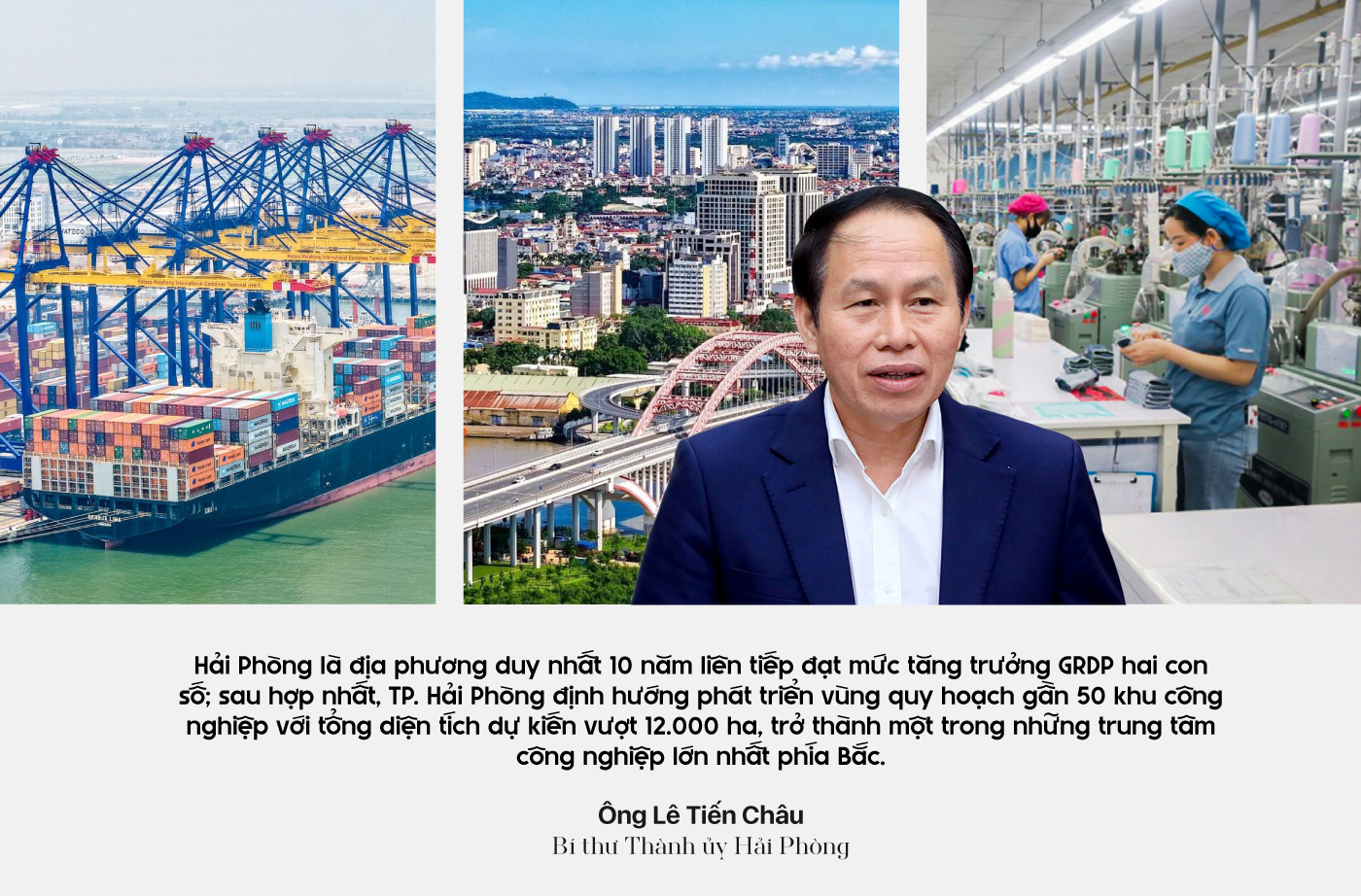
Not stopping at "rearranging the country" to create megacities that are competitive internationally, the Party and State also focus on the quality of internal governance. With the two-level government model, according to reports from the Ministry of Home Affairs and localities, after nearly 4 months of official operation, the two-level government apparatus has basically operated relatively well, gradually entering into order and promoting clear efficiency, transforming the state from centralized management to focused on creating development and serving the people, affirming the correctness and major policies of the Party, receiving consensus and support from the people.
Up to now, 100% of localities have arranged enough leadership positions for People's Councils and People's Committees at all levels. At the same time, the reception and settlement of administrative procedures has had a big change, with 11.5 million online records received and processed, more than 83% of administrative procedures processed online at the local level; technical infrastructure and basic human resources ensure requirements, 17,595 surplus houses and land have been processed; 3,143 commune-level administrative units have full equipment and facilities (accounting for 94.6%); the whole country has proposed to abolish 519 procedures, simplify 2,421 administrative procedures, apply modern one-stop model, many places apply AI and electronic forms.
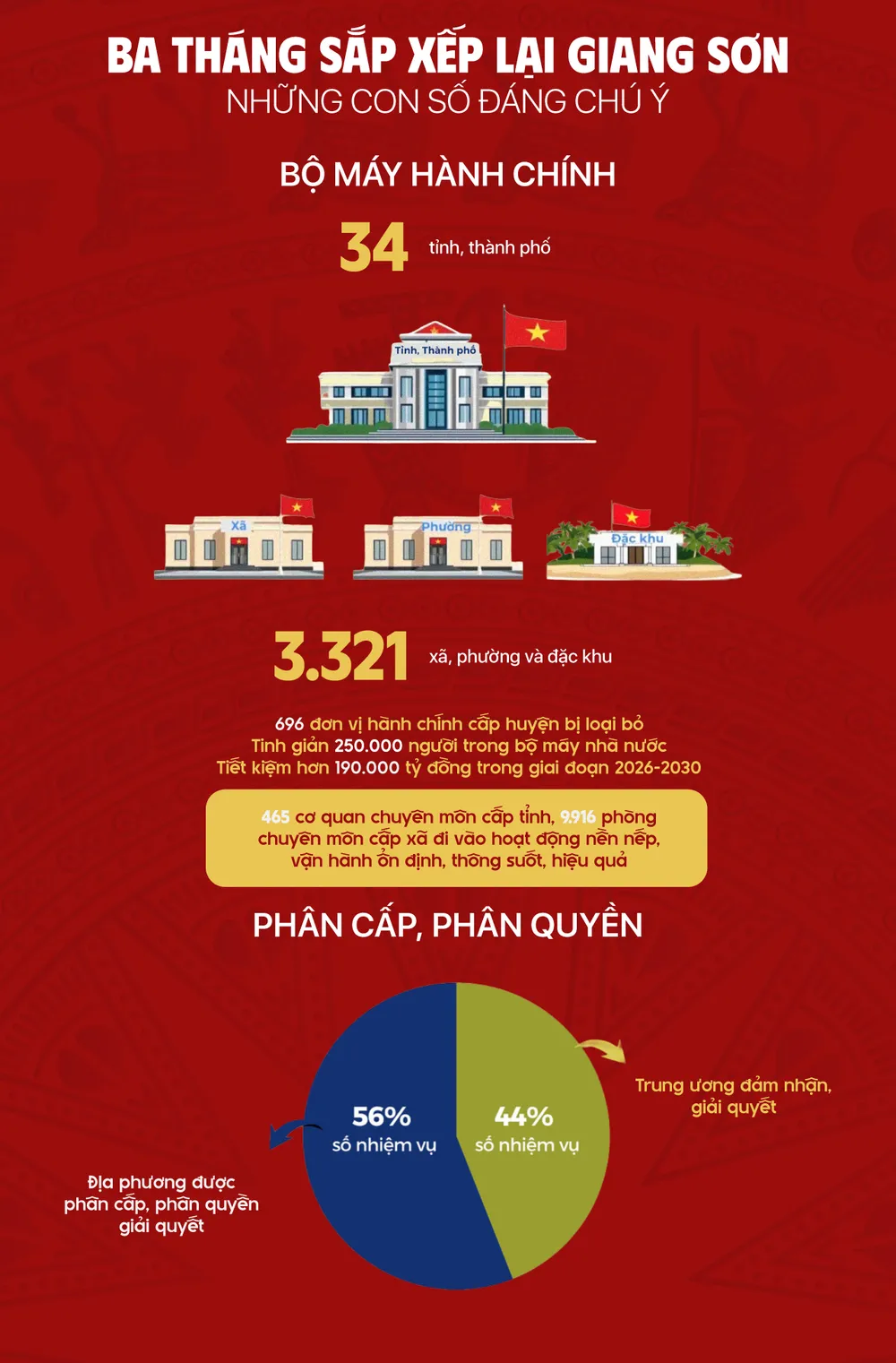
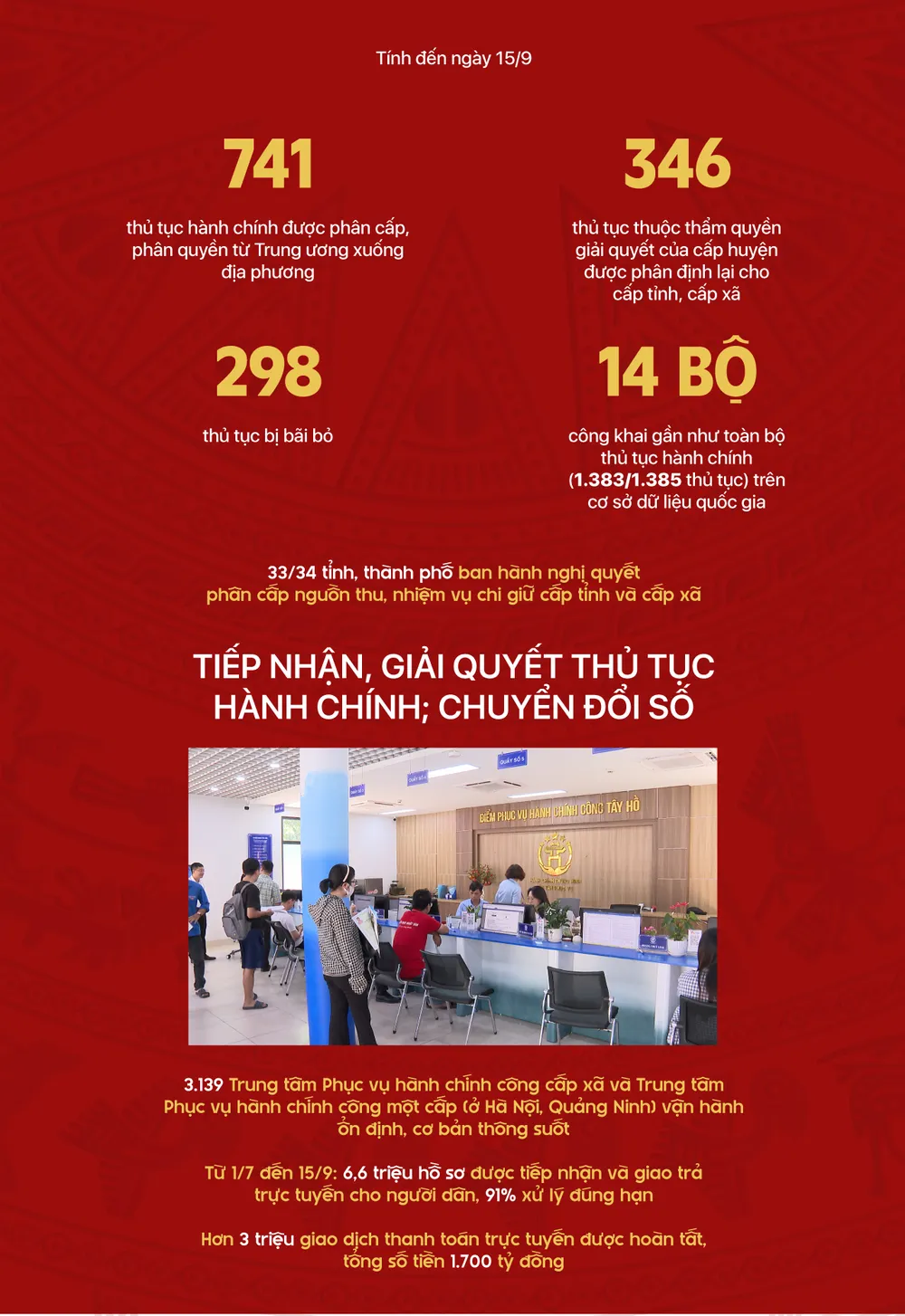
On the morning of October 29, the National Assembly discussed in the hall the socio-economic situation in 2025 and the plan for 2026. Many National Assembly deputies said that the implementation of the 2-level local government model is an important step in institutional reform and streamlining the apparatus, making it operate effectively and efficiently. However, the new model also revealed limitations: Current data is not "correct, sufficient, clean, alive, unified, and shared", causing administrative reform to not be as effective as expected, many public services are still operated manually. There is still a need to adjust in the spirit of doing while adjusting to suit reality.
Delegate Mai Van Hai (Thanh Hoa National Assembly Delegation) commented that the work of law making and enforcement has seen many innovations in thinking and working methods, promptly institutionalizing the Party's policies and resolutions, especially in implementing the 2-level local government model. This is a comprehensive and profound reform in the organization and apparatus arrangement of ministries, branches and localities, which has been directed decisively, flexibly and creatively, bringing positive results, receiving the attention, support and high appreciation from a large number of cadres, party members, voters and people.
Delegate Tran Quoc Tuan (National Assembly Delegation of Vinh Long) said that after implementing the 2-level local government model in 34 provinces and cities, the administrative apparatus was more compact in terms of focal points but the workload increased significantly. Officials and civil servants in many localities, especially at the grassroots level, had to do more work, travel further but their income had not improved.
Delegate Nguyen Quang Huan (National Assembly Delegation of Ho Chi Minh City) proposed that the Government regularly survey and evaluate the difficulties and problems of local governments at two levels, especially at the commune and ward levels in terms of organization, human resources, and budget; at the same time properly implement decentralization, delegation of power, and allocation of resources to promptly resolve them, ensuring that the two-level government model operates effectively and serves the people better.
On the afternoon of October 30 at Dien Hong Hall, after two days of listening to the opinions of delegates and voters, Prime Minister Pham Minh Chinh affirmed: In the process of innovation, some problems related to the operation of the two-level local government have arisen, the Government has directed to immediately resolve those difficulties. At the same time, the head of the Government said that it is necessary to see positive things to be confident in doing: The more pressure our people face, the more effort they will make, in difficulty, "smartness emerges". With the idea of turning nothing into something, turning difficult into easy, turning impossible into possible, we can completely do it and in reality, have proven this.
Prime Minister Pham Minh Chinh once affirmed his determination : No matter what difficulties there are, they are not as difficult as the Covid19 pandemic, so we can only become stronger, not weaker, and we cannot allow ourselves to become weaker . That strong will is the guiding principle for the whole country to continue to perfect and create an effective and efficient government apparatus for the people.

The achievements of domestic institutions are fully promoted when combined with effective economic integration and foreign relations. On April 2, 2025, the United States announced a 46% tax on a number of goods from Vietnam, causing many businesses to worry about the risk of broken orders and escalating costs. In less than 48 hours, General Secretary To Lam, the head of the Party, proactively called the US President, choosing the highest form of diplomacy for dialogue; on April 9, US President Donald Trump extended the 90-day suspension for negotiations.

General Secretary To Lam had a phone call with US President Donald Trump about Vietnam-US relations and negotiations on reciprocal taxes between the two countries.
Immediately after the phone call between General Secretary To Lam and US President Donald Trump on Vietnam-US relations and negotiations on reciprocal taxes between the two countries. On April 6, at the Government Headquarters, Deputy Prime Minister Bui Thanh Son received US Ambassador to Vietnam Marc E. Knapper. The US Ambassador especially appreciated the high-level phone call on April 4 between General Secretary To Lam and President Donald Trump. He assessed: This is the first phone call between US President Donald Trump and a foreign leader after the announcement of the tax, demonstrating the respect and concern of the two leaders for the relationship between the two countries.
On the same afternoon, Prime Minister Pham Minh Chinh had a phone call with Malaysian Prime Minister Anwar Ibrahim to discuss the bilateral relations and assess a number of recent emerging regional and international issues. Malaysian Prime Minister Anwar Ibrahim shared: Malaysia and many countries in the region welcomed and appreciated General Secretary To Lam's phone call with US President Donald Trump, and expressed agreement and support for Vietnam's approach on this issue.
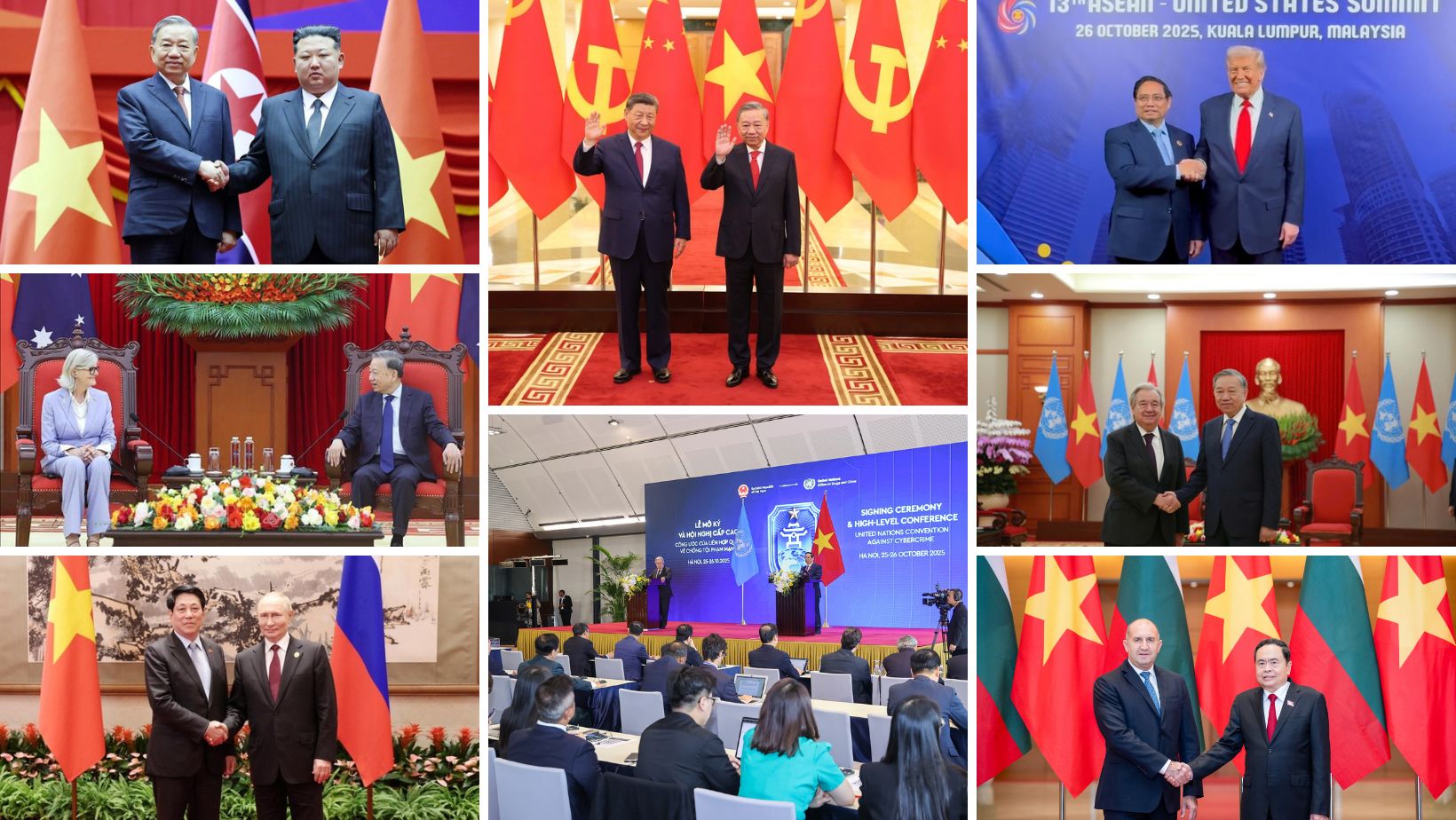
In the context of a volatile world, political stability is a necessary condition; the ability to dialogue, proactively lead and create new opportunities is a sufficient condition for the country to rise up. General Secretary To Lam demonstrates modern leadership thinking: taking stability as the foundation, dialogue as the method, and the people as the center of all decisions. At a higher level, that action shows the readiness to bring Vietnam into a new era - the era of mettle, integration and development.
On the morning of August 1, 2025, the White House announced a decree adjusting the reciprocal tax from 46% to 20%, effective August 7, 2025. After successfully negotiating and reducing the tax rate from 46% to 20%, Vietnam has demonstrated its soft power and economic influence. That victory was immediately followed by a historic milestone when the first global convention named after the capital of Vietnam, the "Hanoi Convention", was opened for signing. This is a clear affirmation: Vietnam is ready to enter an era of bravery, integration and development at the highest international level.
Mr. Saadi Salama, Ambassador of Palestine to Vietnam, said: The Hanoi Convention is the first global treaty named after the capital of Vietnam, marking an important mark of Vietnam on the international cooperation map. At the same time, this event affirms that Vietnam is a responsible member of the United Nations, always proactively promoting international cooperation for a world of peace, stability and sustainable development, in which cyber security is the foundation of trust and cooperation between countries.
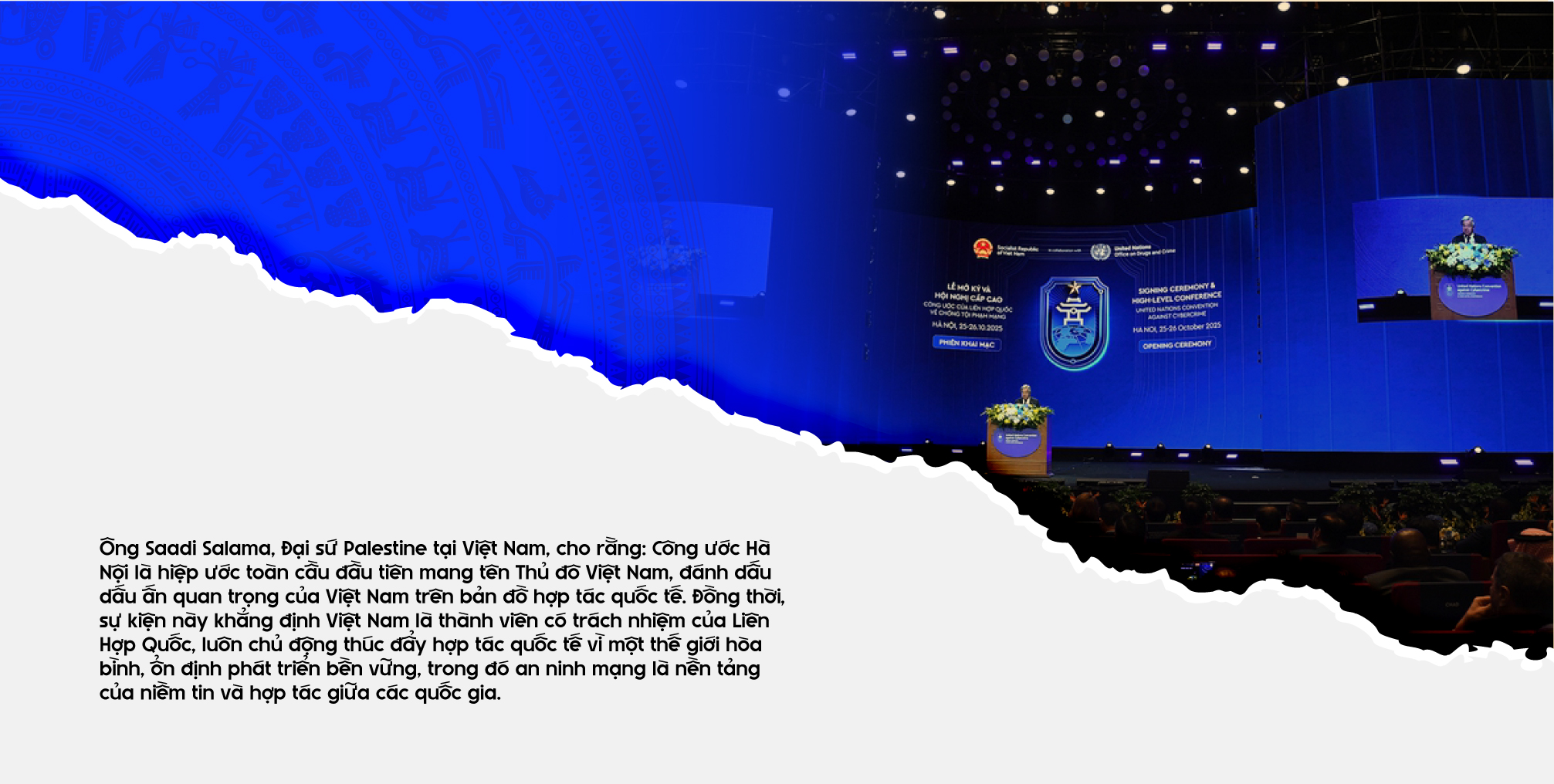
The Hanoi Convention is a symbol of the spirit of integration and global responsibility of Vietnam - a country that is strongly transforming from a "participant" to a "rule-maker" in global issues. That contributes to enhancing Vietnam's position, influence and image in the international arena, in line with the foreign policy of "self-reliance, proactiveness, positivity and deep integration" that the Party and State are implementing.
The signing of the United Nations Convention against Cybercrime in Vietnam is of great significance, not only in terms of law but also in affirming Vietnam's position, prestige and global integration capacity in the digital age. This is the first time a major international convention on preventing and combating cybercrime and cross-border electronic judicial cooperation has been named after Hanoi - the political and diplomatic center of Vietnam.
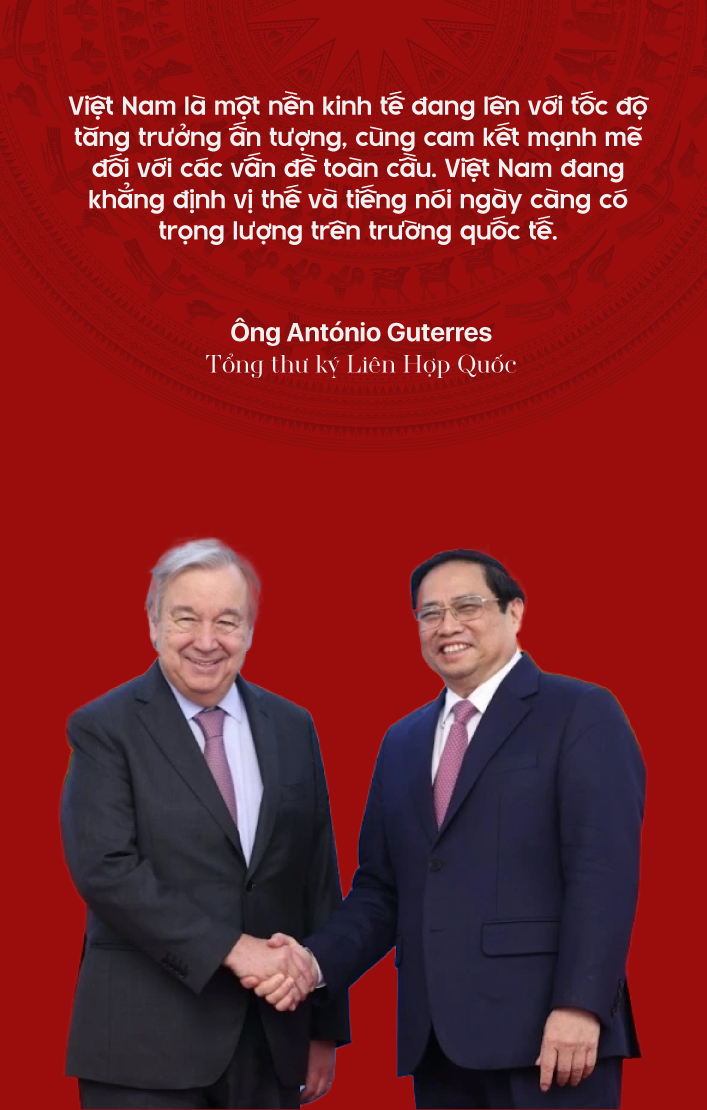
The United Nations Secretary-General highly appreciated the role of Vietnam, saying that Vietnam is not only a country with many contributions to peacekeeping activities, but also a model of a nation that has overcome war, considering Vietnam a living proof of the path of peace, development and a "pillar of multilateralism". United Nations Secretary-General António Guterres commented: Vietnam is an emerging economy with impressive growth rates, along with a strong commitment to global issues. Vietnam is affirming its position and increasingly important voice in the international arena. The world admires Vietnam because after the arduous years of war, Vietnam has risen strongly, becoming one of the most dynamically developing economies in the world. It is this journey that has brought Vietnam prestige and respect from the international community today.
United Nations Secretary-General António Guterres exclusively answered VTV and said that Vietnam is affirming its position and voice with increasing weight in the international arena.
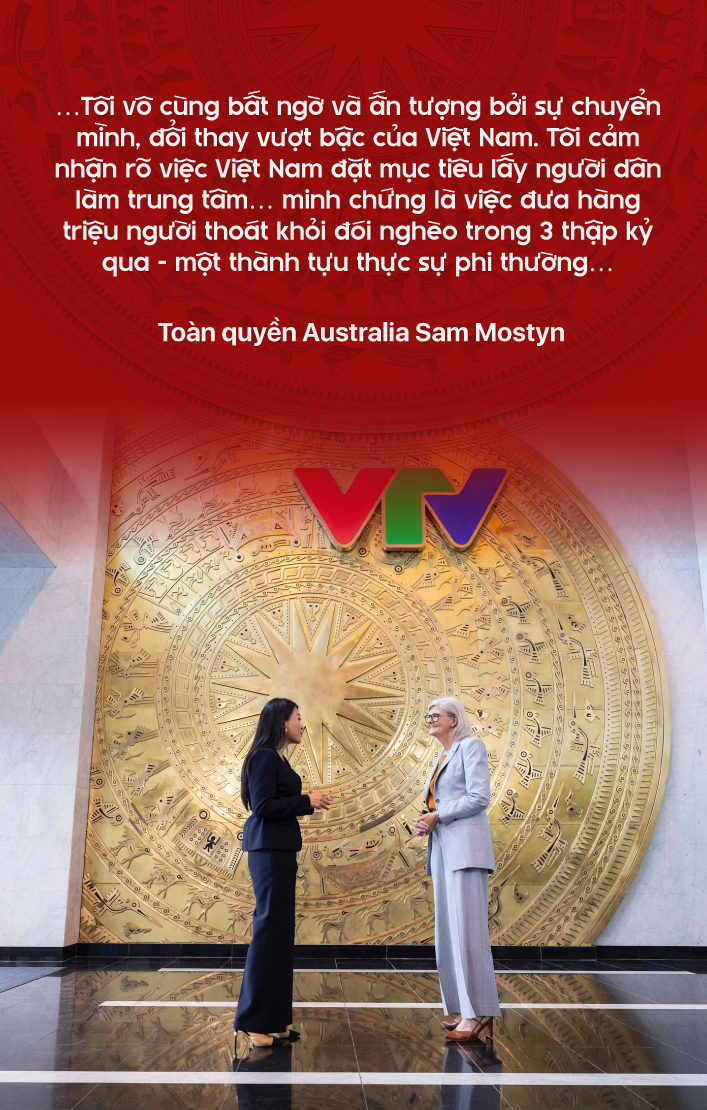
The international recognition of Vietnam, from being called a "pillar of multilateralism" to recognizing its great positive impact on the world, is not accidental. That is what Australian Governor-General Sam Mostyn shared: I am extremely surprised and impressed by the remarkable transformation and change of Vietnam. When talking with General Secretary To Lam, I clearly felt that Vietnam aims to put the people at the center, doing everything for the happiness of the people. The reform policies are designed by the people, for the people, with the proof being the lifting of millions of people out of poverty in the past 3 decades - a truly extraordinary achievement.
Institutional restructuring to liberate resources; proactive foreign affairs to create opportunities. Historic steps - from rearranging the country, streamlining the apparatus, forming growth poles - and proactive foreign affairs to create opportunities. Have affirmed Vietnam's position and increasingly important voice in the international arena. The 14th National Party Congress is laying a solid foundation for a brave and modern Vietnam, entering the era of national growth by 2045: a strong, prosperous and happy Vietnam as General Secretary To Lam's honorable oath before History and the People.

Source: https://vtv.vn/viet-nam-doi-moi-tu-duy-sang-tao-cach-lam-nang-tam-vi-the-100251030120654952.htm




![[Photo] Da Nang: Water gradually recedes, local authorities take advantage of the cleanup](https://vphoto.vietnam.vn/thumb/1200x675/vietnam/resource/IMAGE/2025/10/31/1761897188943_ndo_tr_2-jpg.webp)

![[Photo] Prime Minister Pham Minh Chinh attends the 5th National Press Awards Ceremony on preventing and combating corruption, waste and negativity](https://vphoto.vietnam.vn/thumb/1200x675/vietnam/resource/IMAGE/2025/10/31/1761881588160_dsc-8359-jpg.webp)

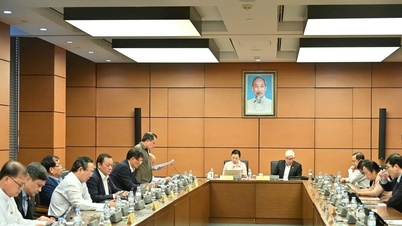

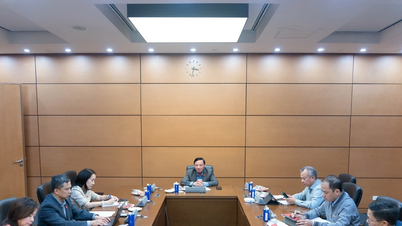

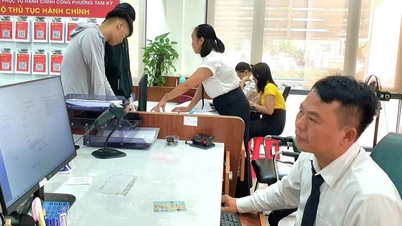

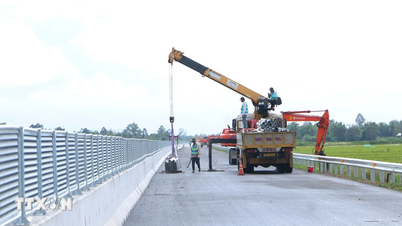
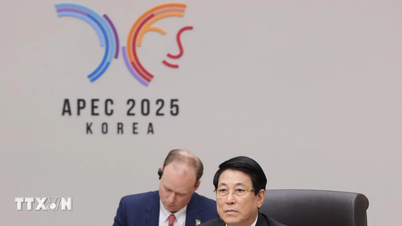
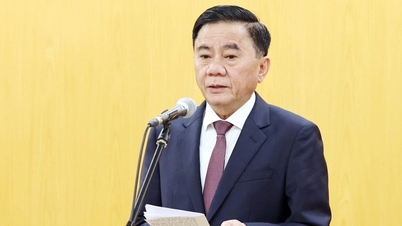




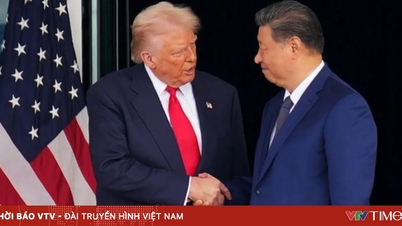
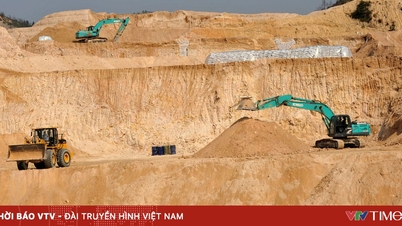
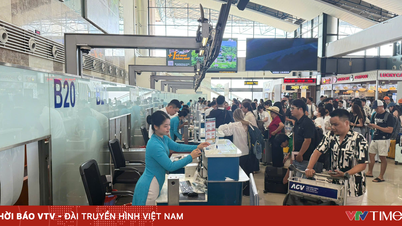
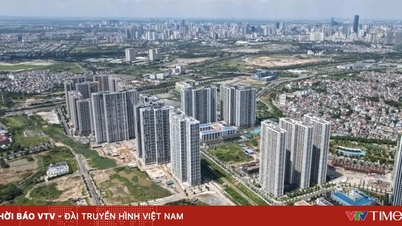
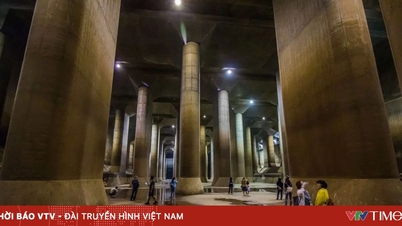
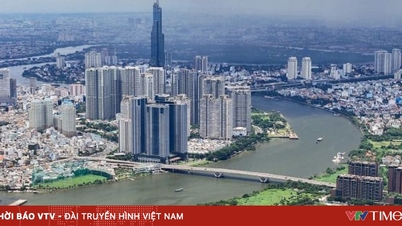
































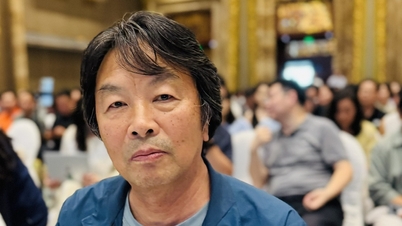

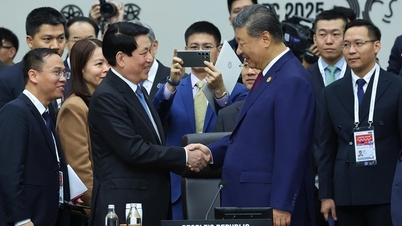

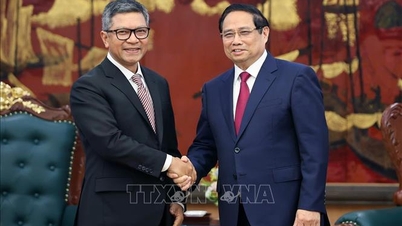





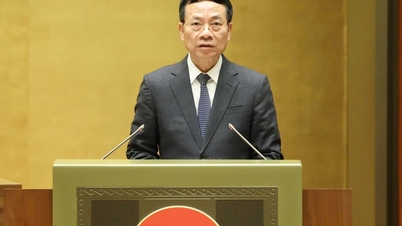
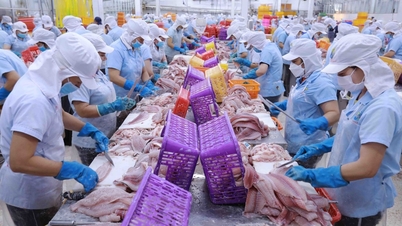
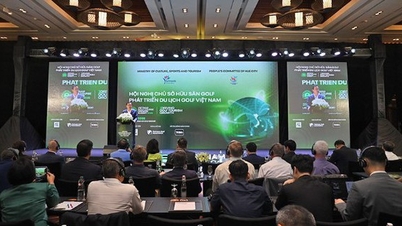




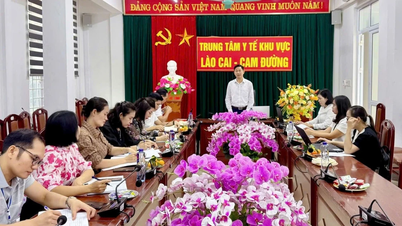


















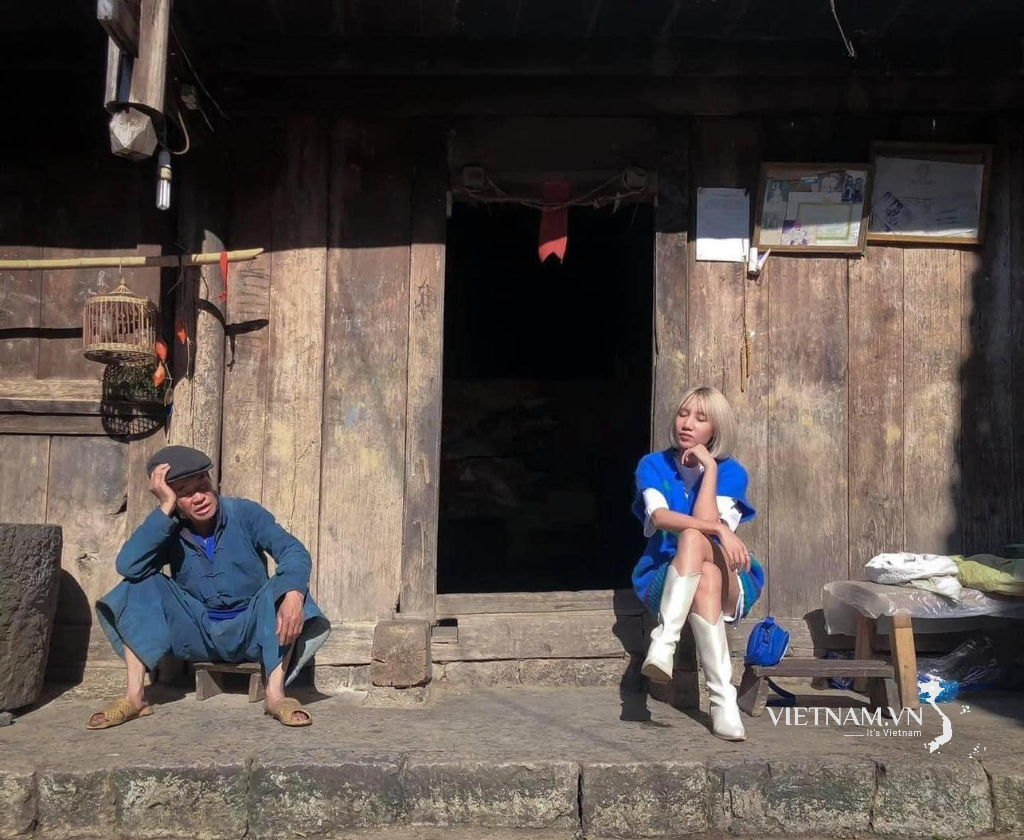
Comment (0)